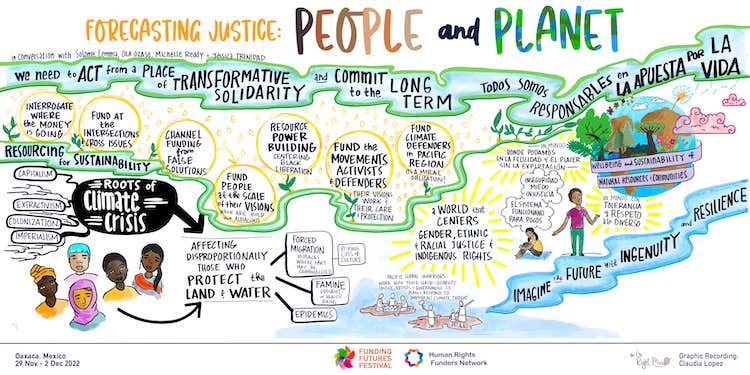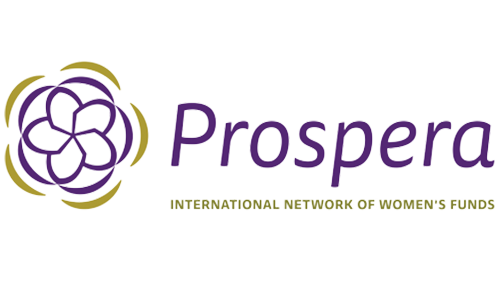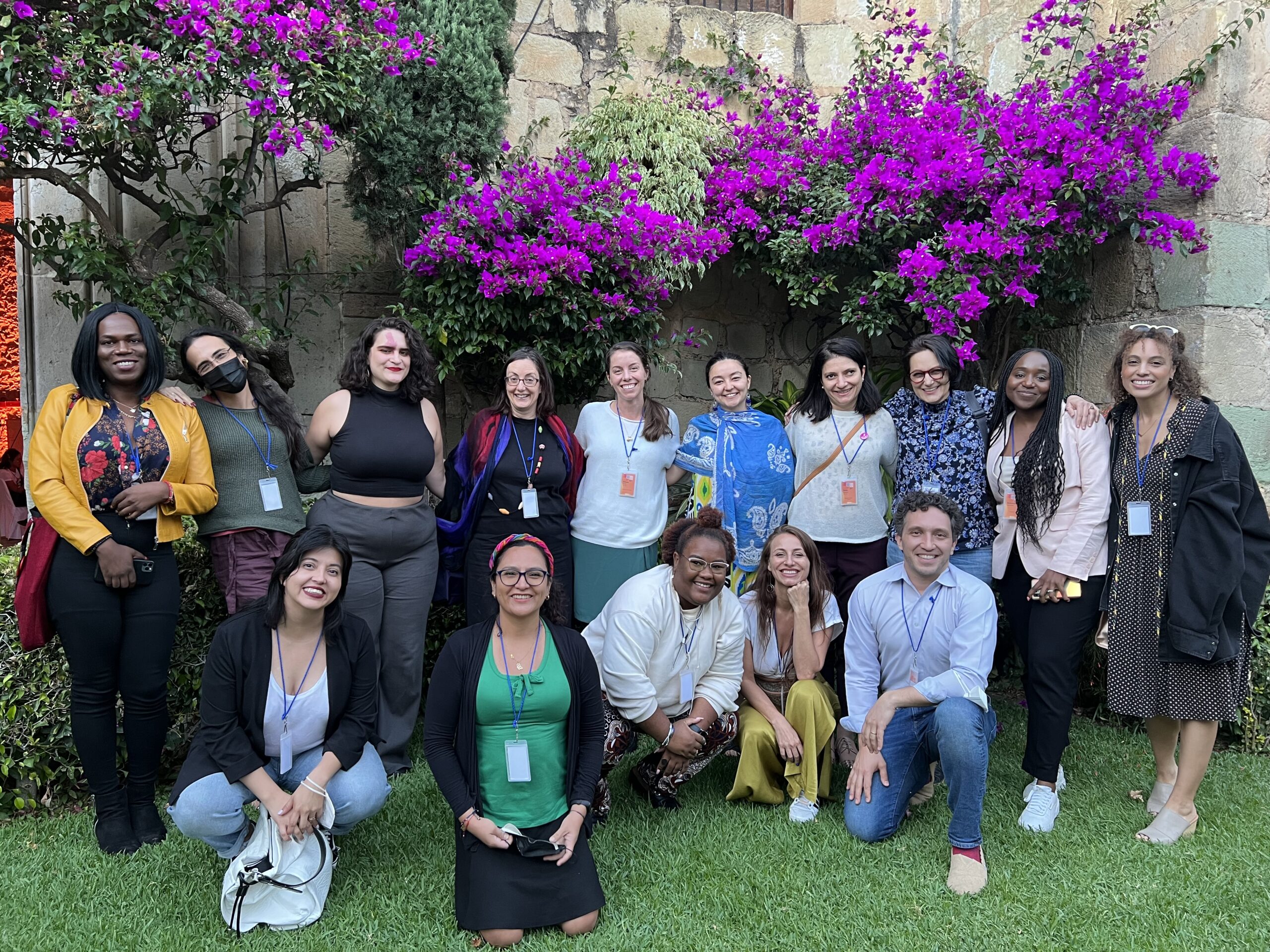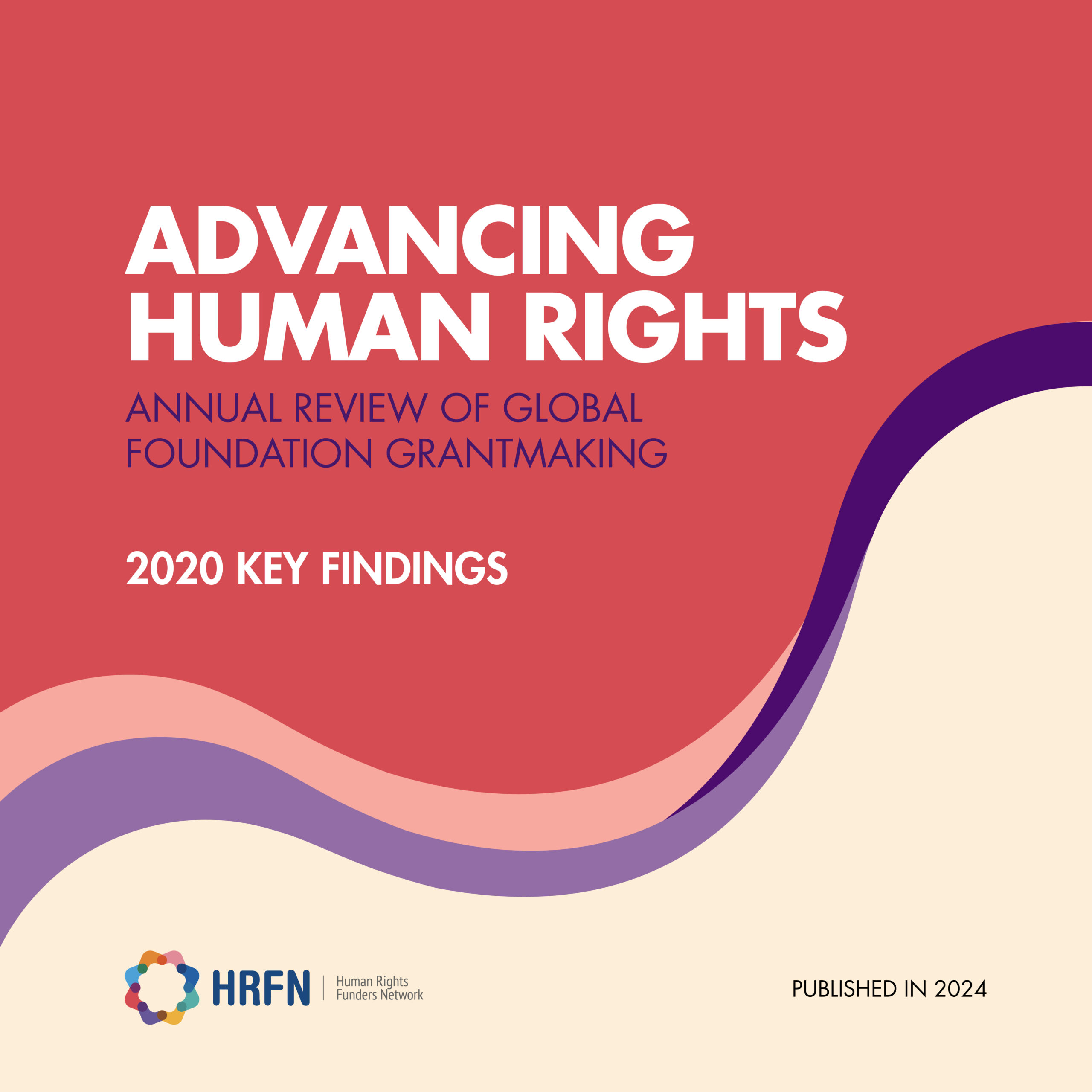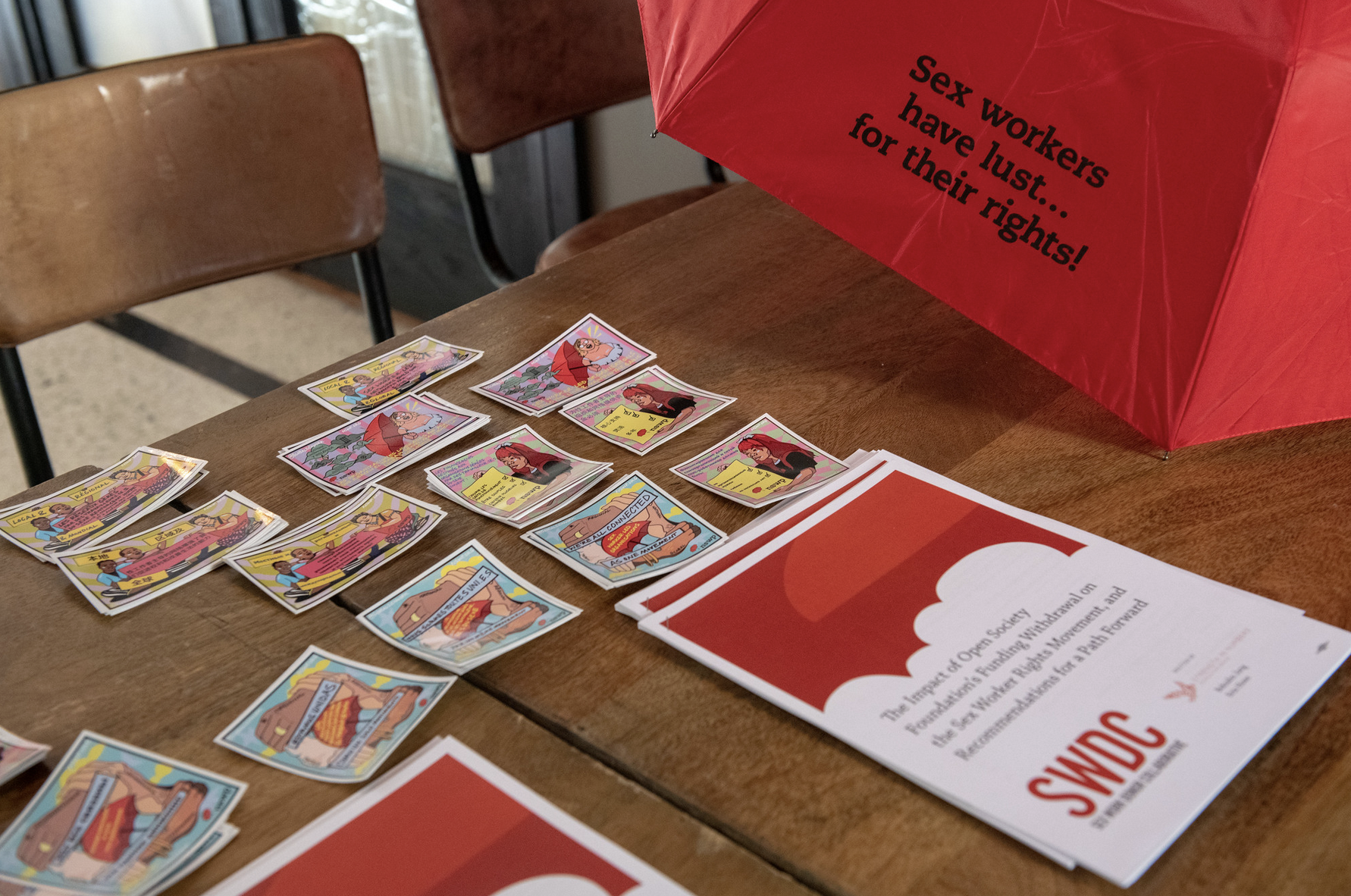REFLECTIONS FROM HRFN’S 2022 FUNDING FUTURES FESTIVAL
In 2022, more than 250 funders and activists from around the world gathered in Oaxaca, Mexico for HRFN’s Funding Futures Festival. Coming from 46 countries and over 130 organizations, participants represented a wide range of the funding ecosystem for human rights, from private and public foundations to regional, thematic, and women’s funds to philanthropic networks to civil society and grassroots groups.
The Festival was a space for imagination and transformation for global human rights philanthropy.
The program was inspired by and grounded in the local context and hosted in partnership with local and regional organizations, including Consorcio Oaxaca, IM-Defensoras (The Mesoamerican Women Human Rights Defenders Initiative), and Prospera – International Network of Women’s Funds and made possible by the logistical support provided by Oaxaca4Meetings.
Through member-led discussions, lightning talks, keynote plenaries, musical performances, art exhibitions, wellness sessions, and site visits, participants envisioned and reflected on funding futures rooted in justice, an abundance of resources for movements, and systems transformed.
HRFN’S FESTIVAL IN NUMBERS
263
PARTICIPANTS
139
INSTITUTIONS / ORGANIZATIONS
46
COUNTRIES
43
MEMBER-LED STRATEGY SESSIONS
23
OPEN GALLERY EXHIBITS
3
MEMBER-LED SITE VISITS
1
CALENDA
GROUNDING IN LOCAL MOVEMENTS
In the State of Oaxaca, the Zapotec, Mixe and Mixtec, Chinantecos, Chatino, Afro-Mexicans, and other ethnic communities are on the frontlines of environmental protection, fighting to defend their land, territories, and natural resources.
The Festival honored the legacy of these communities and Indigenous sovereignty in a variety of ways. Site visits provided a space for learning about organizing in and around Oaxaca. A Tianguis Oaxaqueño, meaning marketplace, run by artisans from social justice movements ensured that participants supported local economies. Finally, evening events offered an opportunity for us to come together to celebrate Oaxaca’s richness—both in terms of arts and culture.
MOVEMENT SITE VISITS
HRFN members, Foundation for a Just Society, and Grassroots International organized site visits that offered Festival participants a chance to engage more deeply with local Indigenous and feminist movements. More than 45 Festival attendees took part in one of the three visits to the organizations described below.
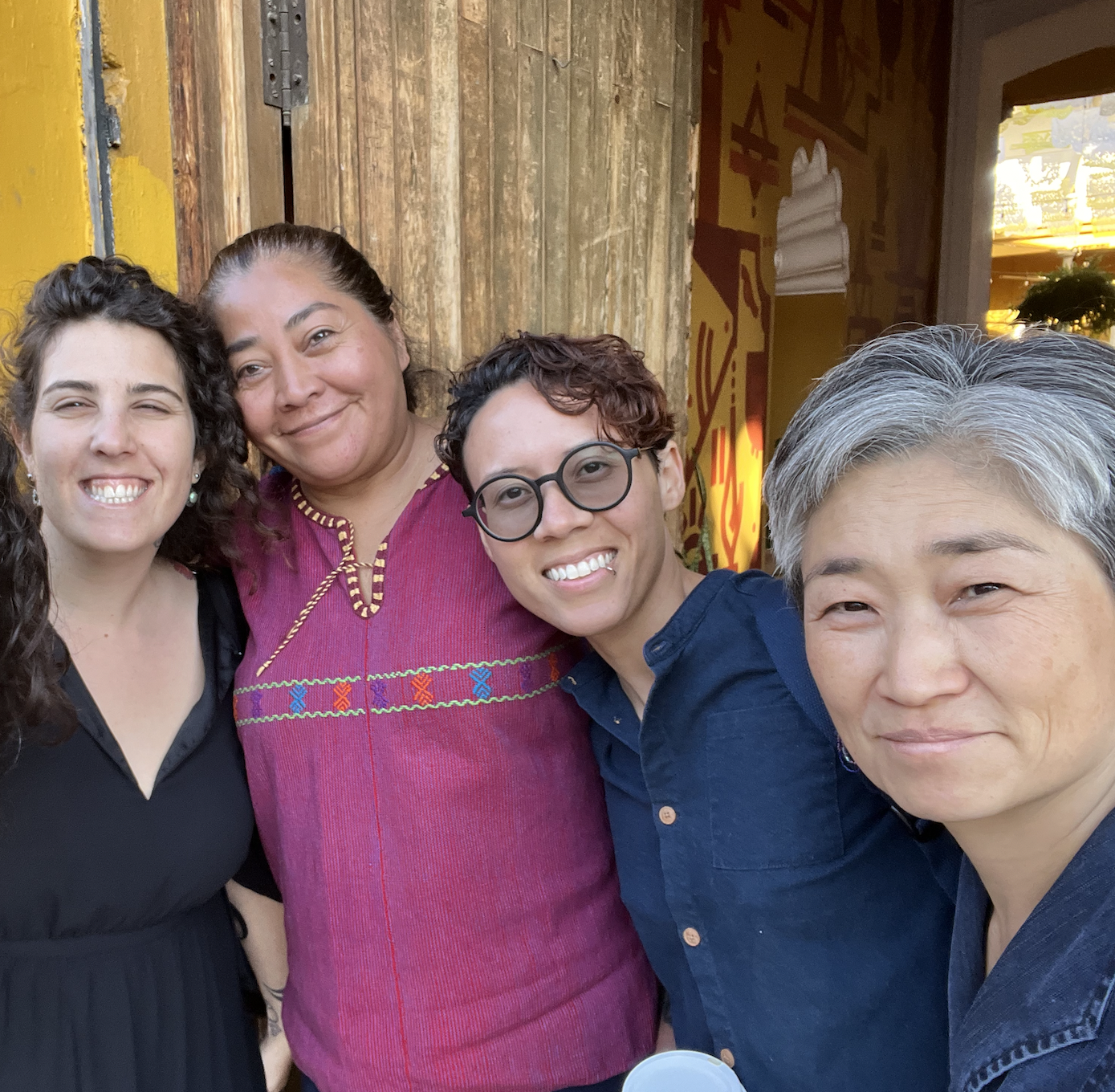
THE UNION OF ORGANIZATIONS OF THE SIERRA JUAREZ OF OAXACA (UNOSJO)
UNOSJO is a Zapoteca Indigenous organization established by 26 regional and community-based Indigenous organizations in the Juarez Mountains of southern Mexico. UNOSJO fosters locally controlled, environmentally and culturally appropriate development and defends the land and territory rights of the area’s Indigenous communities.
[image description: four people with their arms around one another smiling at the camera]
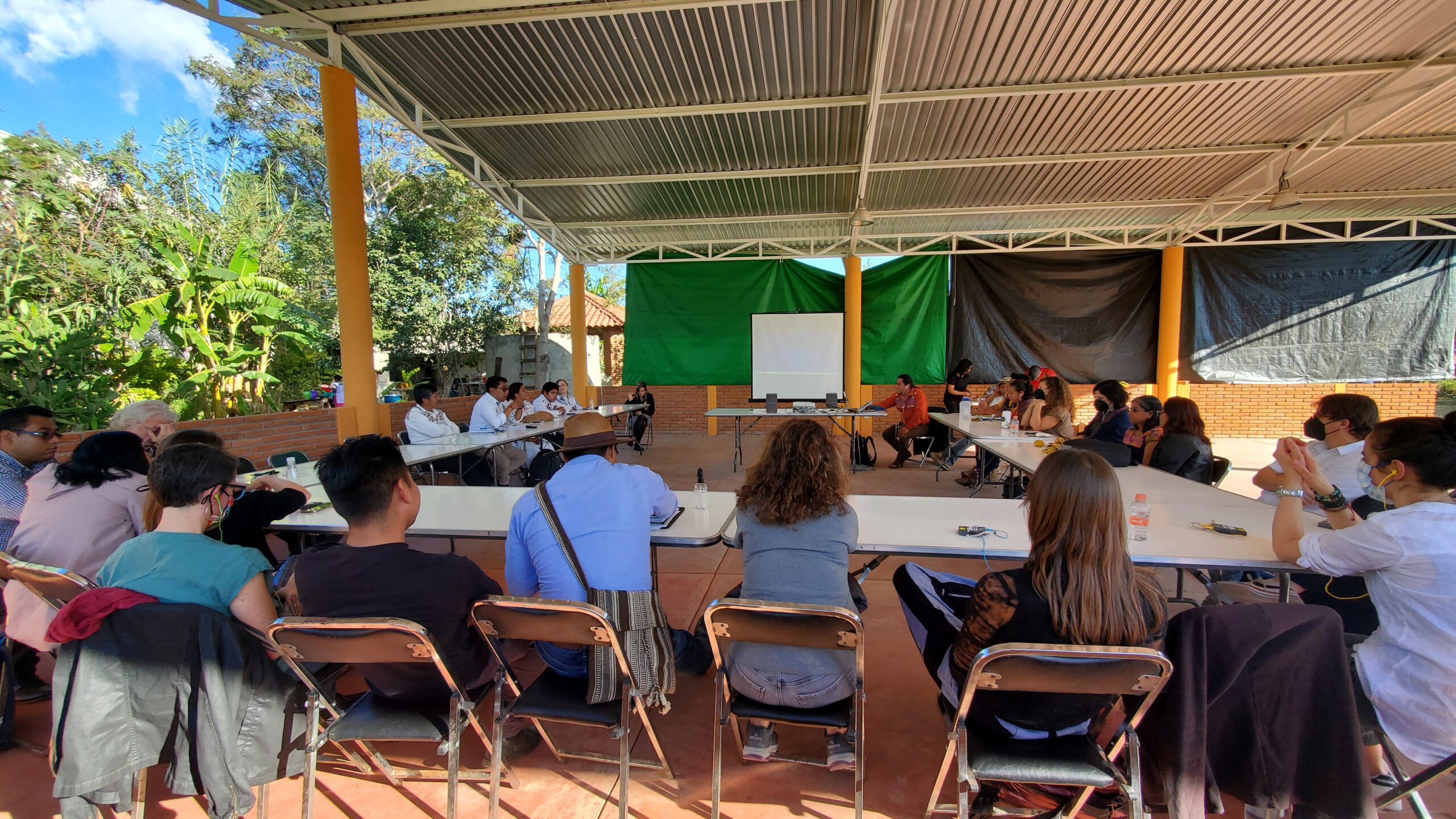
THE MIXE PEOPLES SERVICES (SER MIXE)
SER MIXE is an Indigenous organization that serves over 130,000 people across 30 communities in the state of Oaxaca. SER Mixe plays an important role in defending Indigenous rights—particularly of those communities affected by the deregulation of communal land structures.
[image description: three people sitting on metal chairs at a long, foldable table facing away from the camera toward a small white board]
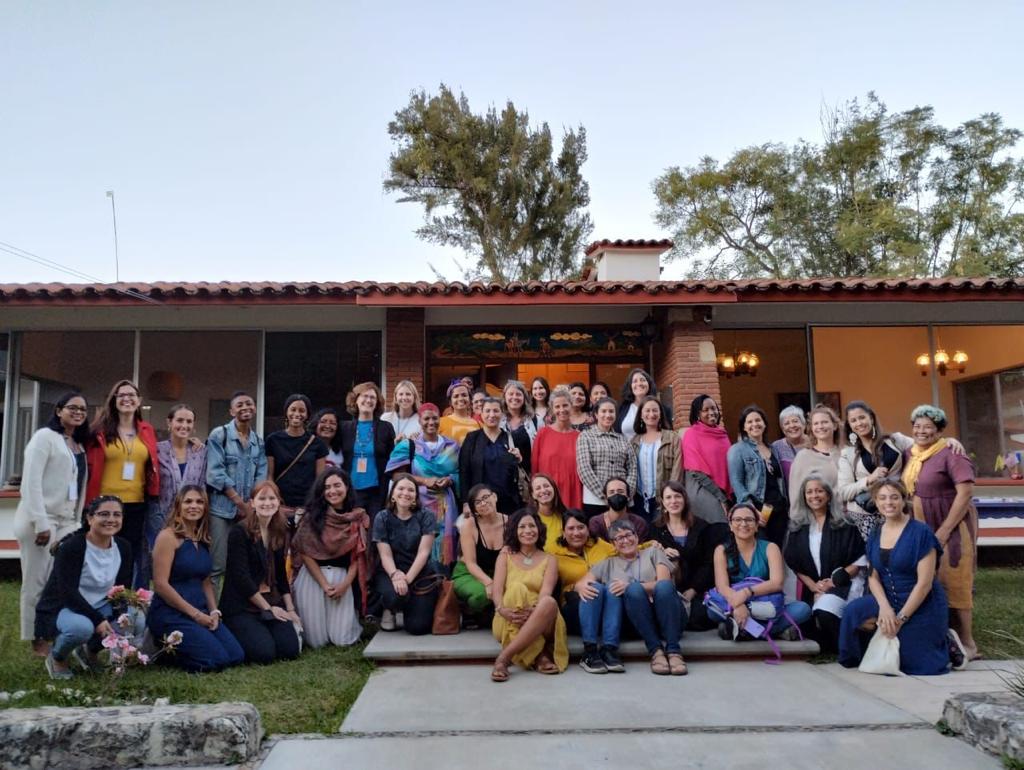
CASA LA SERENA
Casa La Serena offers a space for rest, care, recovery, and collective healing for women human rights defenders and activists from Mesoamerica and other feminist allies from the Global South. By working to prevent and address harm and promote self and collective care, Casa La Serena contributes to the sustainability of social justice movements across the region and beyond.
[image description: a woman in blue jeans and a forest green top, standing up next to three black foldable chairs facing the camera, presenting content on a large projector screen; a man wearing a red long-sleeved sweater with blue jeans and brown shoes seated on another black foldable chair facing the projector screen; another woman, with a mask and a floral shirt, at the edge of the photo also facing the screen]
NURTURING GLOBAL CONNECTIONS
Building relationships across geographies, experiences, and portfolios is at the core of being a global network and sparking meaningful change. The Festival prioritized spaces for participants to interact both formally and informally and each centered joy, community-building, and philanthropic action.
We were proud to host participants from 46 countries. We also acknowledge partnerships and activities that were fundamental in making this a truly global event:
- Prospera co-sponsored the Festival. Member funds brought deep analysis and global connections throughout, and our shared day sparked deeper exploration of what a feminist funding future could look like across the field of human rights philanthropy.
- IM-Defensoras hosted a pre-conference funders briefing with women, trans, and non-binary human rights defenders (HRDs) from Latin America. They were instrumental in gathering 20 HRDs to attend the Festival for the very first time and shape funders’ discussions.
- HRFN’s Global Racial Justice Advisory Council, hailing from 10 countries and representing a range of movements, gathered to plan our upcoming collaborative research and participate in the Festival.
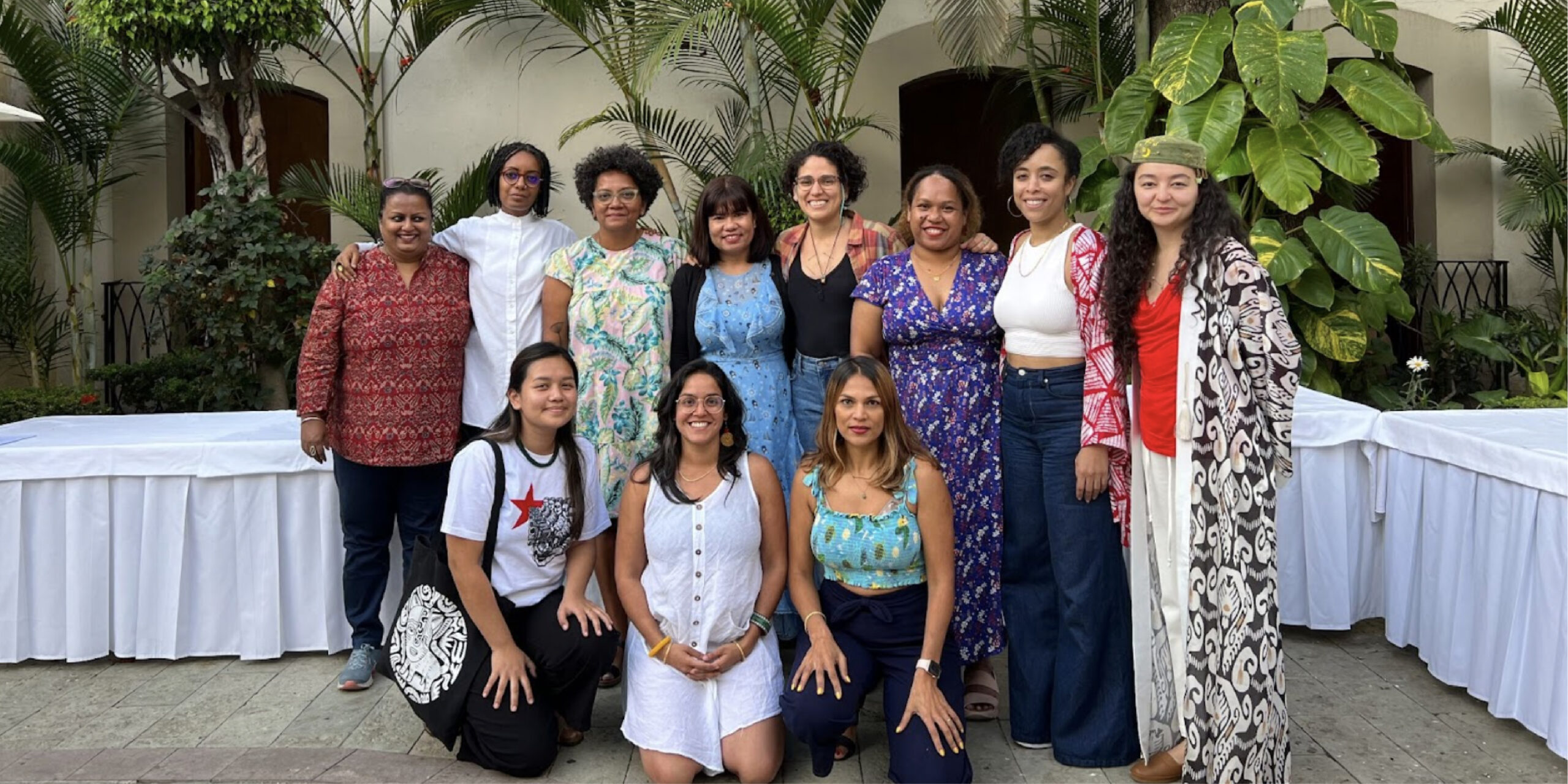
Members of HRFN’s racial justice advisory council gathered for the first time in-person to discuss and plan our research framework.
SHIFTING POWER AND RESOURCES
The morning plenaries and member-led sessions addressed critical questions about the role of philanthropy in resourcing movements and what is required to cultivate further action.
FORECASTING JUSTICE: PEOPLE & PLANET
On Day 1, the opening plenary addressed the climate crisis from a place of opportunity and action. Frontline activists and funders shared stories and strategies for transforming and regenerating resources that center people and our planet.
“What does it look like for human rights philanthropy to center and invest in racial justice and Indigenous rights—communities facing a disproportionate burden of the climate crisis?” – UAF speaker
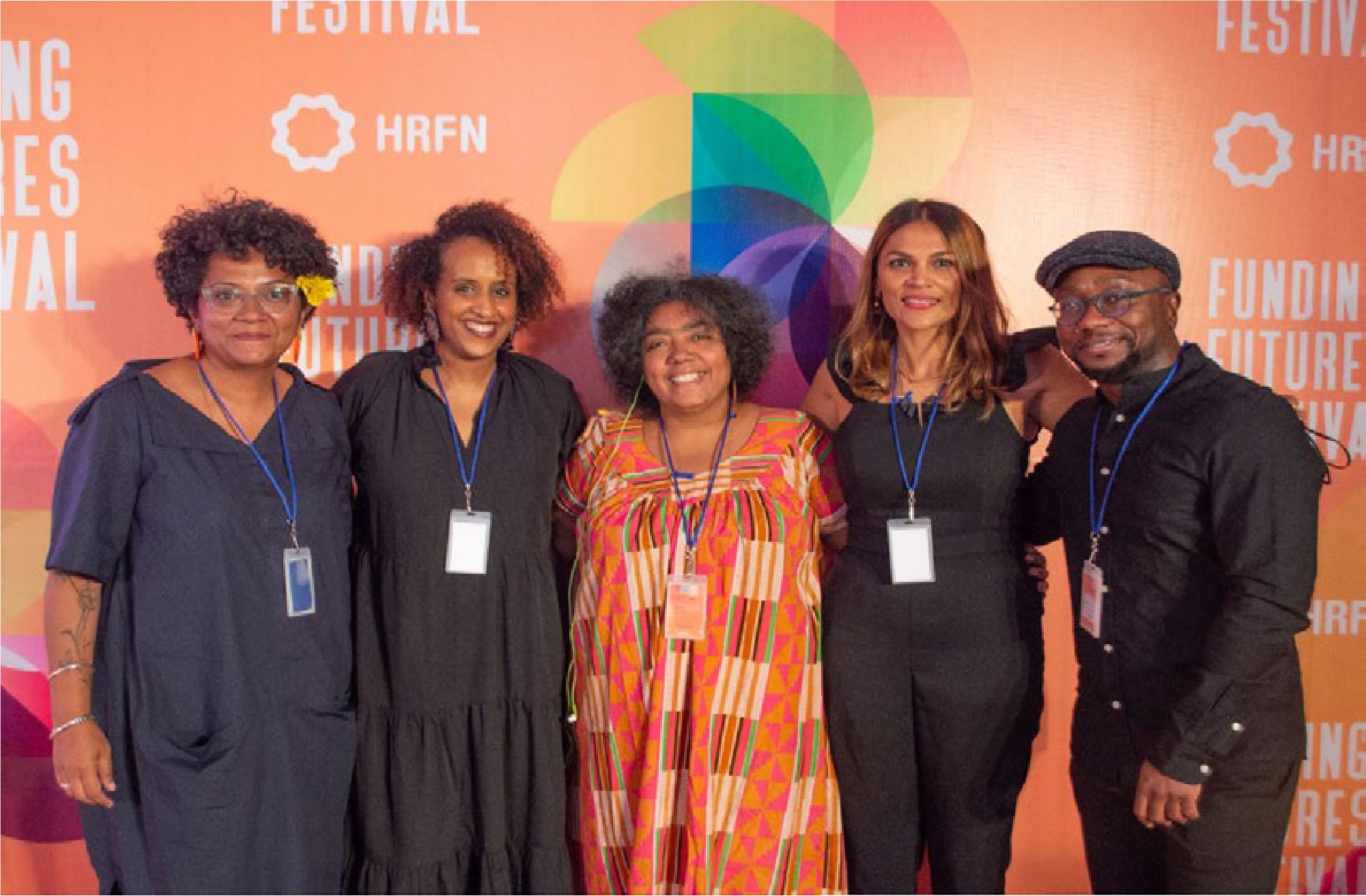
[image description: five people, four wearing black and one in the middle wearing a bright orange patterned dress, with lanyards around their necks, posing together with their arms around one another smiling at the camera] Left to right: Michelle Reddy (Pacific Feminist Fund), Solome Lemma (Thousand Currents), Miriam Miranda (The Black Fraternal Organization of Honduras – OFRANEH), Prachi Patankar (Foundation for a Just Society), Ola Ozase (Black Migrant Power Fund/Four Freedoms Fund)
LESSONS IN THE WAKE OF CRISIS
On Day 2, human rights defenders from Afghanistan, Nicaragua, Uganda, and Ukraine discussed how long-term crises intersect. Sponsored by the Urgent Action Funds, this keynote showcased how feminist models can serve as a roadmap for responsive funding across sectors during times of crisis.
How do we leverage our role as human rights funders to mitigate the power imbalances in traditional humanitarian crisis response without duplicating efforts?
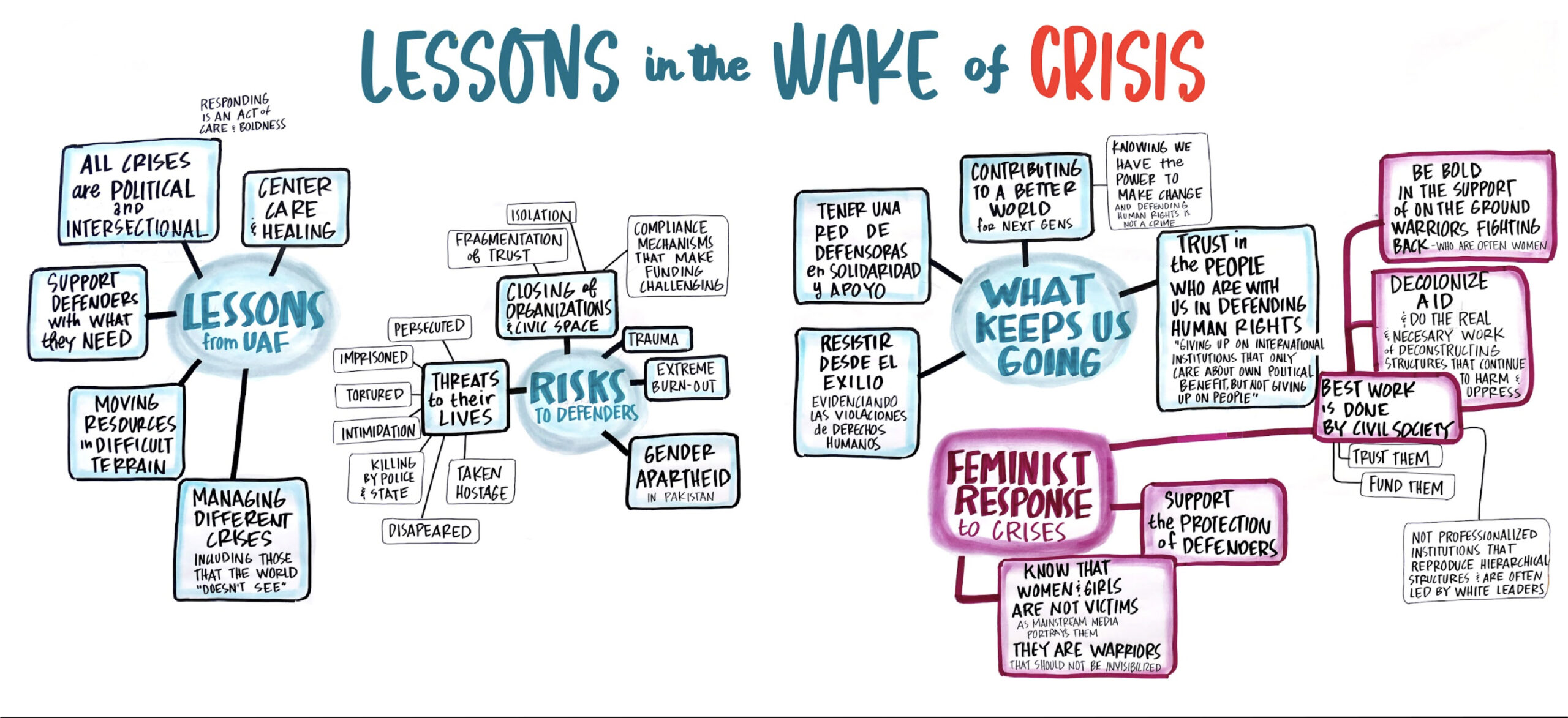
[image description: graphic on a white background with black lettering and blue highlights that reads “Lessons from UAF” in the middle circle, with boxes branching off the side which read in all caps writing, from top center moving clockwise, “Center Care and Healing”, “Managing Different Crises including those that the world ‘doesn’t see'”, “Moving Resources in Difficult Terrain”, “Support Defenders With What They Need””, “All Crises are Political and Intersectional”, with a side note on the very top that reads “Responding is an act of care and boldness”]
LIGHTNING TALKS
On Day 3, our final plenary ignited joy and inspiration. In a series of lightning talks outlining “ideas from the future”, seven speakers poetically brought power shifting–and its potential–into the present.
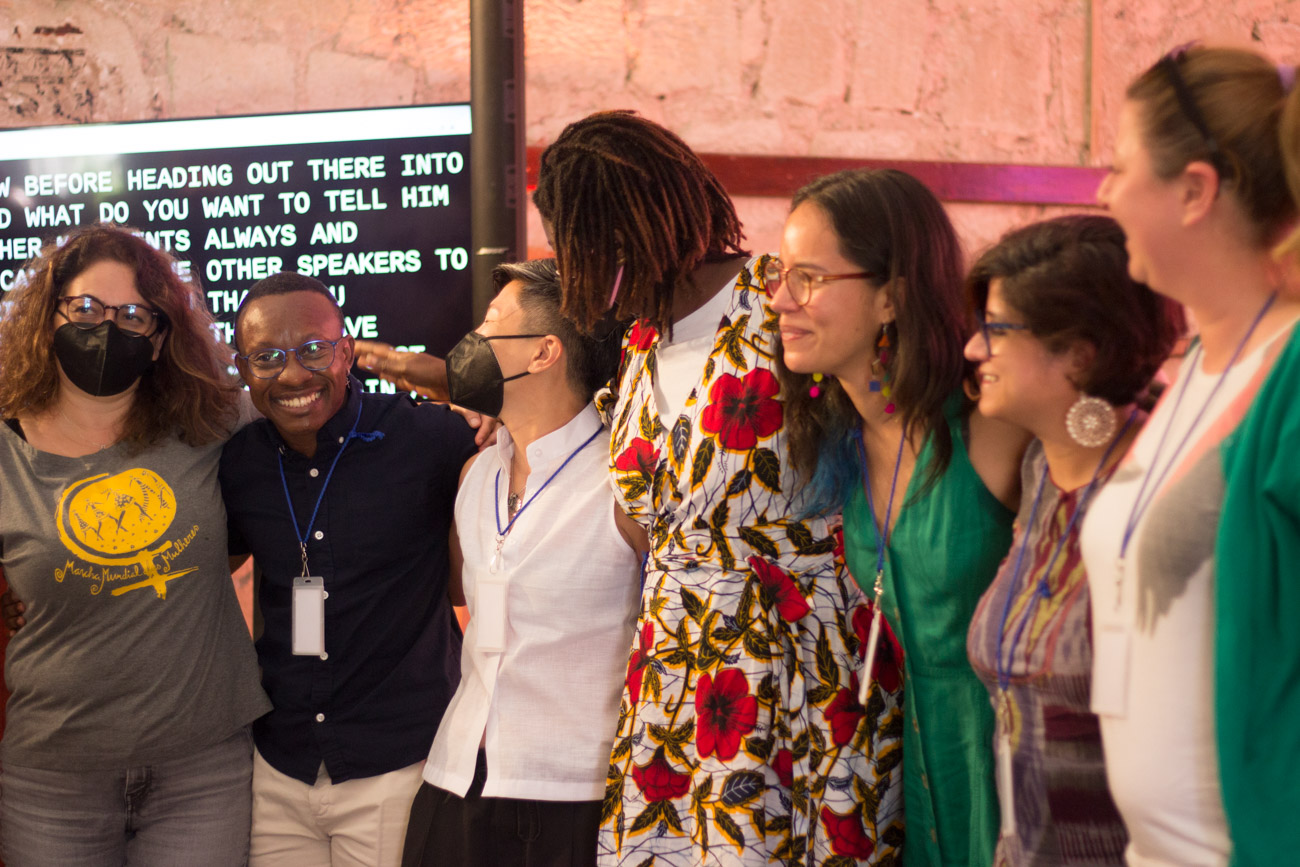
[image description: seven people, two with black masks and the others without, with their arms around one another smiling and laughing wearing (from left to right) a grey t-shirt with a yellow graphic, a black short-sleeved button down shirt, a white tunic, a dress with bright red flowers, a green dress with multicolored earrings, a multicolored dress with big brown and white earrings, and a white top with a green cardigan]
DISCOVERY JOURNEYS
In the afternoons, we broke into smaller groups for Discovery Journeys—collaborative, member-led sessions sparking critical questions and deeper collaborations to shift and transform philanthropy. Imagined as engaging, dynamic spaces for more intimate conversations, the Discovery Journeys provided a space for participants to grapple with a variety of topics, including:
- structural analyses of funding from the traditionally popular to the ambitiously novel;
- hopeful, yet grounded, analysis of funding in crisis contexts – capped by the launch of a new fund at the Festival; and
- beautiful imaginings of generative funding ecosystems that see abortion as a fundamental human right, sex workers as trailblazers for community care and mutual aid, and art as a vehicle for healing and transformation.
“DISCOVERY JOURNEYS WERE THE BEST PART OF THE FESTIVAL – THE MOST CONCRETE AND IDEA-GENERATING.”
– Festival Attendee
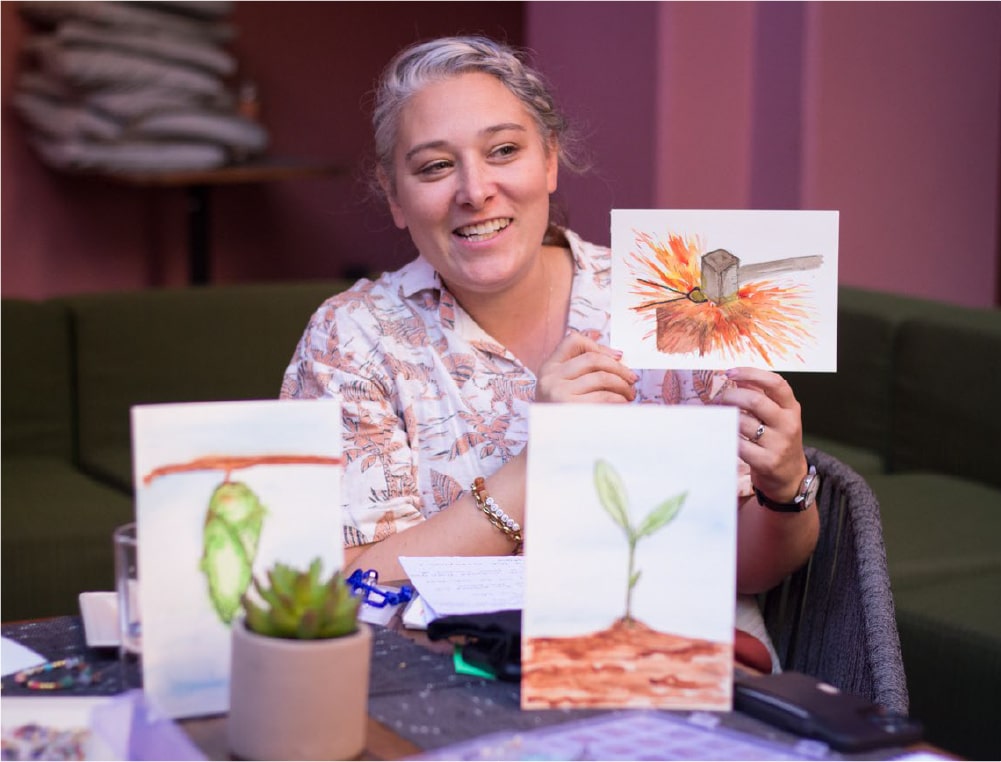
[image description: a woman with white and grey hair wearing a floral collared shirt looking slightly right of the camera and holding up a paper with a drawn image of a hammer hitting a brown platform and emitting orange, yellow, and red sparks; two other drawn pictures–one of a chrysalis and another of a small plant shoot emerging from brown soil–are in front of her on a table covered with some art supplies, a succulent, a bracelet, and a cell phone]
CENTERING CULTURAL ORGANIZING
Our evenings were filled with programming designed to showcase the arts and culture of Oaxaca.
WELCOME DINNER
Our welcome dinner the night before the Festival began provided a space to (re)connect and build community.
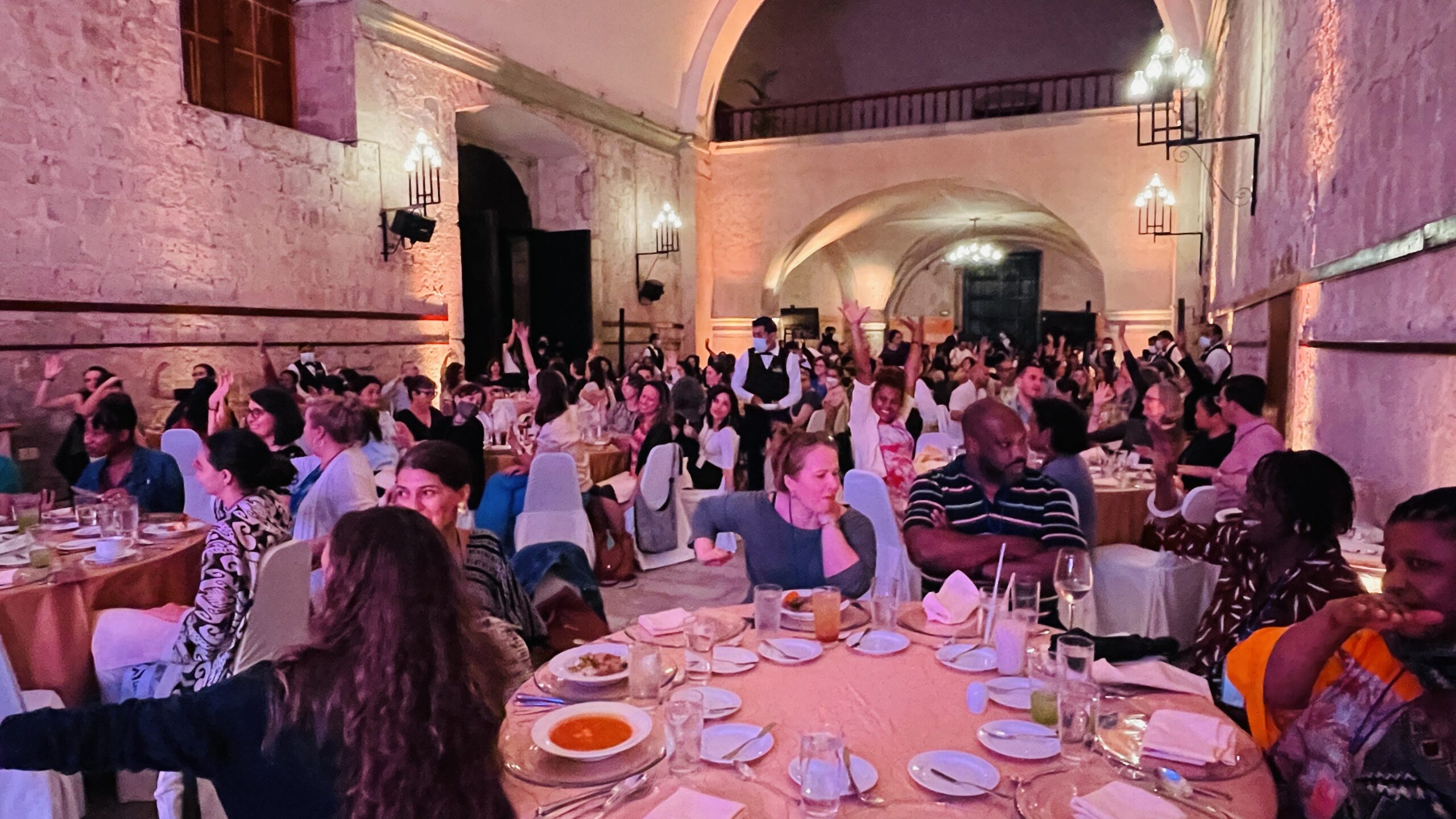
[image description: a shot of several dozens of people in a large room with stone walls and yellow lighting sitting around round tables with various types of food on round, white plates and silverware]
CALENDA
On the first day of the Festival, we paraded together through the streets of Oaxaca, inspired by the colorful and joyful Oaxacan tradition of calendas. We were accompanied by a live band, Chinas Oaxaquenãs (women wearing traditional costumes), and monos (giant papier-mâché puppets) wearing green abortion rights bandanas.
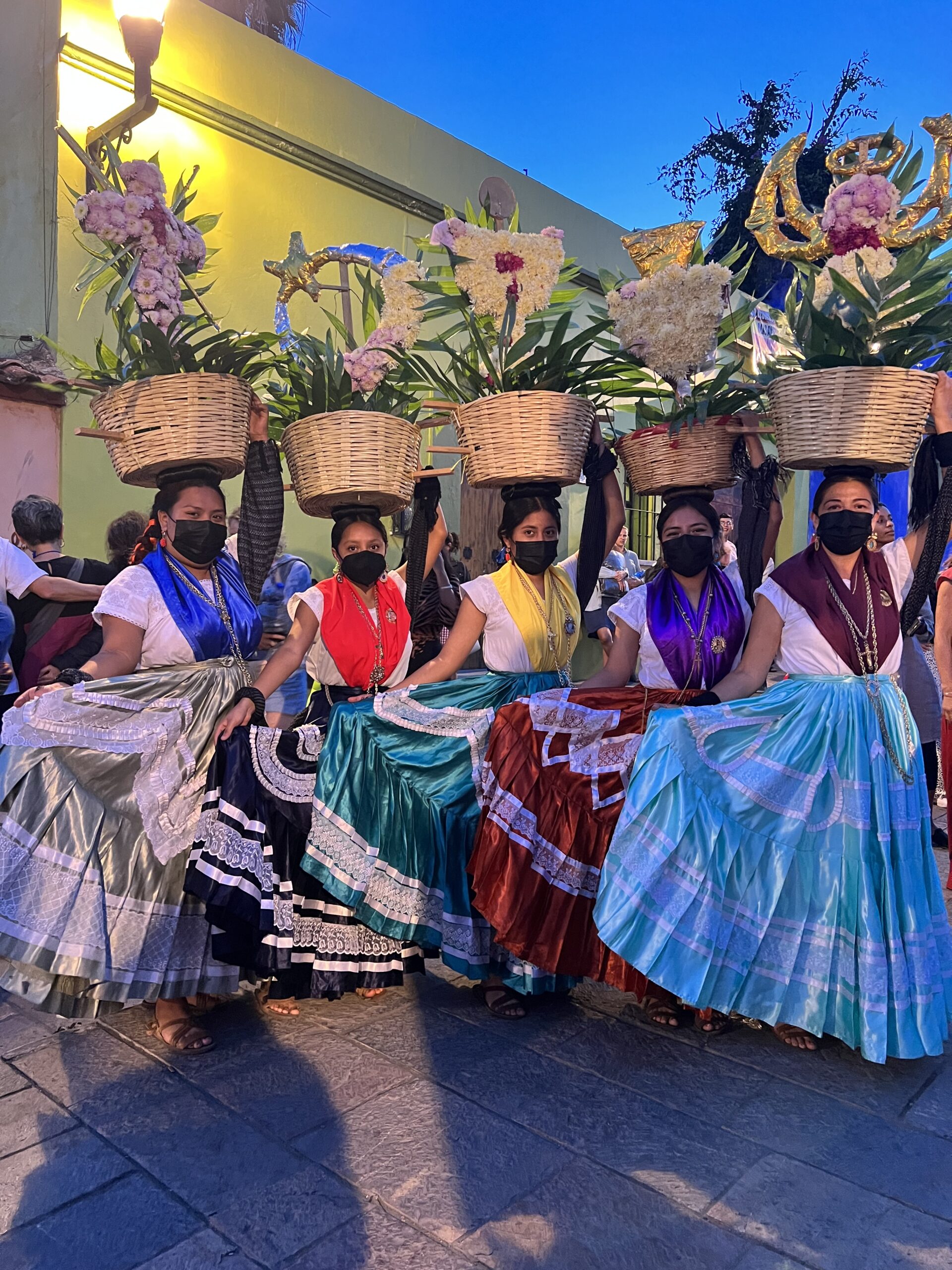
[image description: five women wearing black masks and colorful skirts and scarves holding baskets on their heads containing giant papier-mâché puppets]
MARTHA TOLEDO CONCERT
The calenda led us to a reception where the talented Zapotec singer, Martha Toledo, and her band shared their local musical traditions.
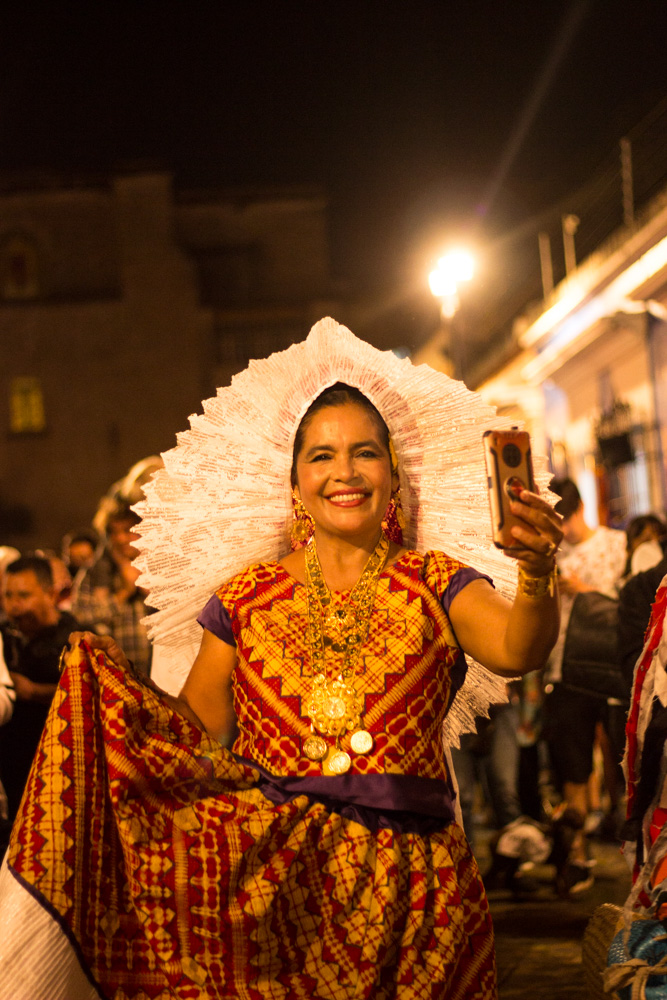
[image description: a woman in a colorful red, orange, yellow, and purple pattered dress with a large, white head piece and gold jewelry smiling at the camera while holding her phone up]
OPEN GALLERY
Our Open Gallery on the second day of the Festival served as a lively space for participants to share art, ideas, and inspiration. Exhibits addressed various issues critical to global human rights philanthropy, from documentaries unpacking the climate crisis, to a funder toolkit showcasing participatory models for engaging children and youth, to reflections on the impact of COVID-19 on feminist movements.

[image description: two women with their arms around one another standing at the head of a long table adorned with various pamphlets, papers, and posters, three women behind them–one seated, all slightly blurred, sharing something on a phone with a woman in purple at the other side of the table]
MOVING FORWARD
At HRFN, we have reflected considerably on the power and energy of our gathering, areas of growth for our organization and community, and the considerable responsibility and potential of our field. As we look to the future, we are left with a number of questions, including:
- How can the relationships built and nurtured at the Festival spark action for justice across the philanthropic field?
- How can HRFN serve as an ongoing space for inspiration and connection, while also building infrastructure for more effective, coordinated, and movement-centered resourcing?
- Who is not in the room that should be? What can we do together to bring in funders who are not yet fully aligned with human rights approaches?
- How do we make spaces truly accessible? Where can we grow in enacting stronger language and disability justice practices? How can we cultivate spaces that honor movements without reinscribing power dynamics of the funders and “the funded”?
- What is the balance between embracing a vision for the future while also staying grounded in the present, especially the brilliant organizing already happening across the Global South and East?
- How can we celebrate, rejoice, and replenish through our shared visions for justice?
Thank you for being part of our community.
For those who joined us in Oaxaca, it was wonderful to see you there. For those who couldn’t attend, we hope you can join us at our next Festival, planned for early/mid-2024.
Interested in joining our community? Become a member.
To get the latest information, sign up for our newsletter.
GRATITUDE
HRFN would like to thank the following people and organizations for their support.
ADVISORS
Anya Stern, Independent
Ashley Thomas, Wellspring Philanthropic Fund
Katie Corker, Equitas
Maria Amália Souza, Fundo Casa Socioambiental
Mayra Zamaniego López, FRIDA | The Young Feminist Fund
Saulo Araujo, Grassroots International
Vinita Sahasranaman, Urgent Action Fund Asia and Pacific
Ximena Andion, Ford Foundation, Mexico and Central America
STEERING COMMITTEE
Anisha Chugh, Women’s Fund Asia
Ciciley (CC) Moore, W.K. Kellogg Foundation
Jen Bokoff, Disability Rights Fund
Katy Love, Consultant, formerly at Wikimedia Foundation
Kézha Hatier-Riess, Global Greengrants Fund
Luam Kidane, Thousand Currents
Maria Amalia Souza, CASA Socio-Environmental Fund
Megan Selland, Wellspring Philanthropic Fund
Mukami Marete, UHAI – The East Africa Sexual Health and Rights Initiative
Rachel Freed, Unitarian Universalist Service Committee
Saulo Araujo, Grassroots International
Tania Turner, Fondo Semillas
Tracey Gurd, American Jewish World Service
Ximena Andion Ibañez, Ford Foundation
SPONSOR
The Funding Futures Festival was made possible thanks to a generous grant from our sponsor, The William and Flora Hewlett Foundation.
We also gratefully acknowledge HRFN’s core supporters, whose grants sustain and embolden our work, including this event:
This Festival was supported by the contributions of HRFN’s dues-paying members.

